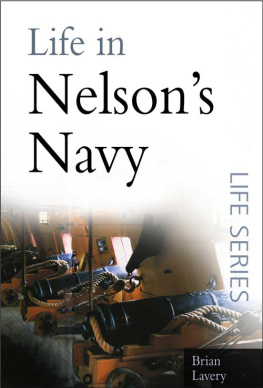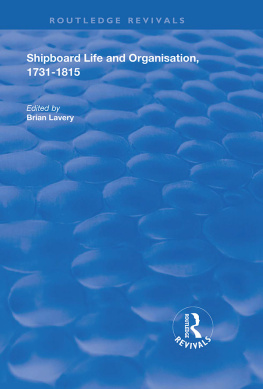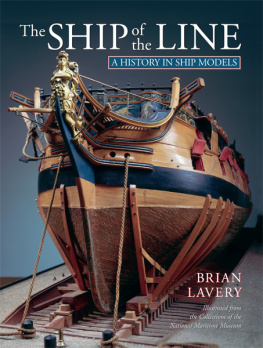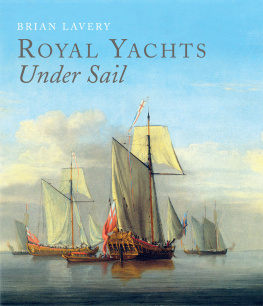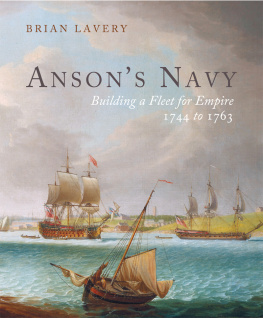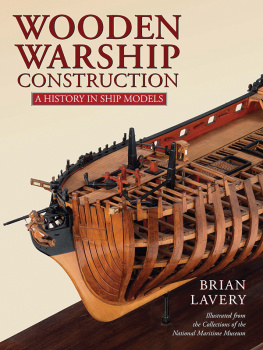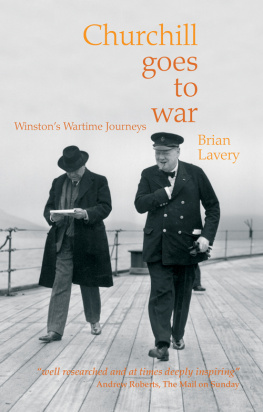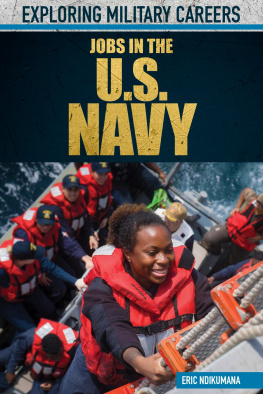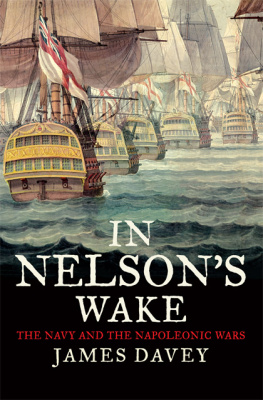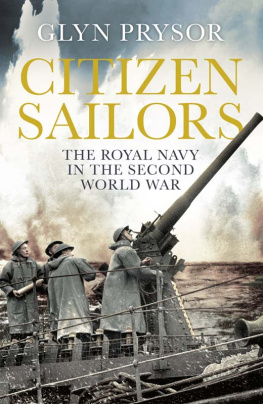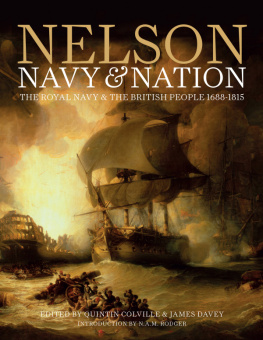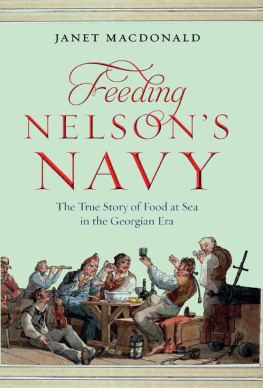Life in
Nelsons
Navy
Brian Lavery
First published in 2007
The History Press
The Mill, Brimscombe Port
Stroud, Gloucestershire, GL 5 2 QG
www.thehistorypress.co.uk
This ebook edition first published in 2011
All rights reserved
Brian Lavery, 2007, 2011
This ebook is copyright material and must not be copied, reproduced, transferred, distributed, leased, licensed or publicly performed or used in any way except as specifically permitted in writing by the publishers, as allowed under the terms and conditions under which it was purchased or as strictly permitted by applicable copyright law. Any unauthorised distribution or use of this text may be a direct infringement of the authors and publishers rights, and those responsible may be liable in law accordingly.
Brian Lavery has asserted the moral right to be identified as the author of this work.
EPUB ISBN 978 0 7524 7059 7
MOBI ISBN 978 0 7524 7060 3
Original typesetting by The History Press
Contents
CHAPTER 1
Joining the Navy
F or a young man with good connections and some education, the Royal Navy in the days of Nelson offered an exciting career. He would join the most successful armed force in the world, with the possible exception of the French army a force which defeated every opponent who dared to put to sea, often against heavy odds. He could see the world, fight the enemies of his king, and possibly become rich through prize money. He might hope to follow in the tradition of Nelson himself, who was killed in 1805 after leading his fleet into three major victories.
Much depended on the young mans own talents: he could rise to become an admiral, and possibly a knight or a lord. His parents might worry about losing their son at sea, but for a large family a naval career had the great advantage that his education was almost free. It was no job for a quiet, studious boy, and he had to be as courageous as Jane Austens brother Francis:
Fearless of danger, braving pain,
And threatend very oft in vain.
The boy would start at the age of about 12 or 13. His parents had to find a Royal Navy captain who was willing to take him on, perhaps a relative or a political or business connection. The young Horatio Nelson was lucky that his uncle, Captain Maurice Suckling, was appointed to a ship when the boy was just the right age. Arriving on board, the young man would be rated as a captains servant or a volunteer first class. He was often bewildered at first. He lived in a mess below decks with the other boys, where anarchy often reigned. Above decks, there were perhaps 40 miles of rope rigging that he had to understand, and up to 100 guns. He might find himself in battle within days of joining, as did Frederick Hoffman in the frigate Blonde in the English Channel in 1793: Two of the enemys frigates were now within gunshot and the two others nearing us fast. We had almost despaired of escaping, when fortunately one of our shot brought down the advanced frigates fore topsail yard.
The young man would carry on with his education under the ships chaplain or schoolmaster, and learn navigation under the master. After three years he could be promoted to midshipman and begin to take some responsibility, perhaps taking charge of a group of seamen for welfare and disciplinary purposes, commanding one of the ships boats or a group of guns in action, or acting as deputy to the officer of the watch. He might spend some time in the more senior post of masters mate. After a total of six years he was entitled to sit a stiff oral examination before three captains, which not everyone passed. William Badcock was examined by Sir Andrew Snape Hammond in May 1805, and on the way in he met a midshipman who had failed. Badcock was questioned on double altitude, bearings and distances &c. and asked to issue the orders to take an imaginary ship out of harbour. He passed, bowed to the officers and bolted out of the room to be surrounded in a moment by the other poor fellows, who were anxiously waiting their turn to be called in for examination.
For every lieutenant on the average ship, there were about a hundred others seamen, craftsmen, marines, servants, boys and unskilled landsmen. The seamen were the most important, the skilled men who steered the ship, handed the sails and took charge of the guns in action. The navy had no training scheme for them, and most of them were recruited from merchant ships, where they too had begun their careers as boys. According to the economist Adam Smith,
their skill and dexterity are much superior to that of almost any artificers, and though their whole life is one continuous scene of danger and hardship, yet for all the skill, for all the hardships and dangers, while they remain in the condition of common sailors, they receive scarce any other recompense than the pleasure of exercising the one and of surmounting the other. Their wages are not greater than those of common labourers at the port which regulates the rate of seamans wages.
Merchant wages were high in wartime, and the press gang was often necessary to get men into the navy. Popular myth suggests that this terrorised whole districts, and dragged unwilling landsmen into the fleet. In practice the members of the gang often lived in fear of their own safety, and they usually took only experienced men for the navy. Some gangs were based in seaport towns such as London, Liverpool, Hull and Newcastle. Others operated off the coast, stopping merchant ships and taking part of the crew off. Some gangs were members of the crews of warships at sea, some were based permanently on shore. It was a hard life for the officers and men of the gang, and in 1814 Lieutenant Forbes in Greenock wanted to be replaced in consequence of the repeated insults I meet with in the streets of Greenock, and the mob having proceeded even up the stairs to the door of my lodgings... It is hard to say what so ferocious a people might do. At Hull early the next year, a seaman escaped the press gang by slipping out of his jacket. He was recaptured but,
A number of workmen joined the mob and liberated the sailor. A regular chase, or running fight, was kept up through Low-gate. The gang applied in vain for assistance at the Mansion House, and dispersed to their several homes; but the mob, now exasperated, proceeded in a riotous manner through the market place and Humber Street to the press gangs rendezvous... the mob (many of whom were sailors) completely wrecked the house.
Apart from low wages, sailors hated the navy because they could not leave at the end of a voyage. When their ship came out of service, they were usually transferred to another without any choice in the matter, and perhaps separated from their messmates and friends. Unless they were ill enough to be invalided out, or they deserted, they were in until the end of the war. When he was impressed in 1794, Seaman John Nicol wrote, I found myself in a situation I could not leave, a bondage which had been imposed on me against my will. The French Revolutionary War lasted nine years, from 1793 to 1802, and the Napoleonic Wars from 1803 to 1815, with one short break. Men had no absolute right to shore leave, and captains were reluctant to grant it in case the men deserted. It was possible for a man to spend several years without setting foot on shore.
Arriving on board a warship, the experienced seamen were rated by the first lieutenant. Some might become petty officers, taking charge of a group of men working on one of the masts, or giving orders to the crew as boatswains mates. The more experienced men would become able seamen, if they had at least seven years at sea and had various skills. Less experienced men were rated as ordinary seamen, and in 1807 they had a basic pay of 1 5

